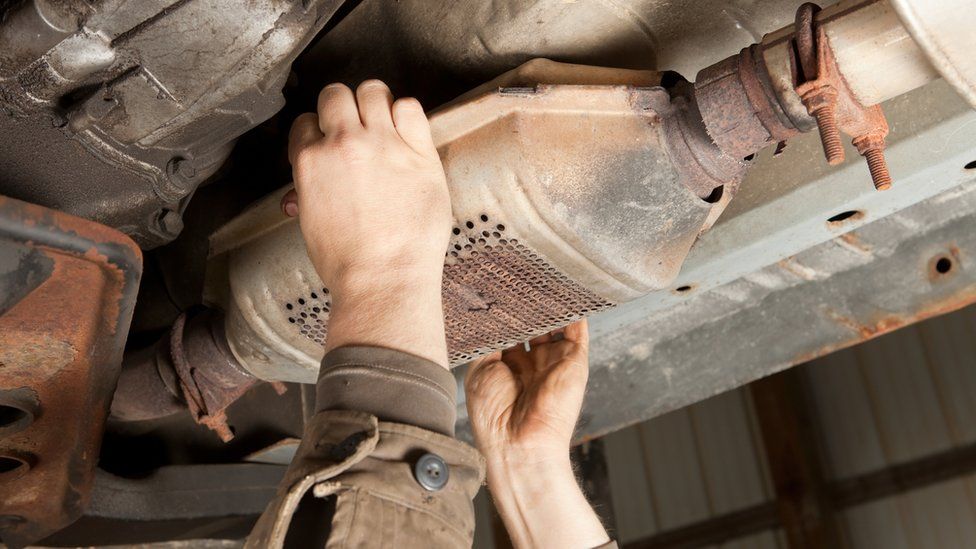ARTICLE AD BOX
 Image source, Getty Images
Image source, Getty Images
Converters contain precious metals attractive to thieves
Tens of thousands of catalytic converter thefts are going unsolved, with only 1% of cases resulting in someone being charged, figures obtained by the Liberal Democrats suggest.
Data from 20 police forces in England and Wales for 2017-2021 indicate a suspect was charged in only 548 cases.
Catalytic converters fitted in car exhaust systems reduce their emission of toxic gases and pollutants.
Thieves are attracted by the valuable metals the devices contain.
Police say converters can often be removed in under a minute, and are most frequently stolen in car parks, before being sold to scrapyards, online or shipped out of the country.
Hybrid vehicles are most commonly targeted as their metals are more valuable, but any vehicle can be at risk of catalytic converter theft.
The Home Office says it has national programmes to target metal theft, including catalytic converters.
The police figures were disclosed in response to a Freedom of Information request.
In the 20 police areas where full information was provided, a total of 50,223 thefts of catalytic converters were reported in the five-year period.
Full figures from some of the biggest forces - including West Midlands Police and Greater Manchester Police - were not available.
In the 20 force areas surveyed, the number of thefts surged from 742 reported in 2017 to 19,451 in 2020, before falling in 2021 - the first full year of the Covid pandemic - to 15,780.
By far the highest number of thefts from 2017-2021 - 36,586 - occurred in London. Just 544 were solved.
In Hertfordshire, in 2020, 915 cases were recorded; in South Yorkshire, the figure was 669. No one was charged in either police area in that year.
The Liberal Democrats have called for more to be done to crack down on the problem, including more visible community policing to deter thieves.
'Theft epidemic'
The party said the Conservatives' 2019 manifesto promise to recruit 20,000 more police officers by March 2023 had stalled.
Home Office figures show that by 30 September, 15,343 extra officers had been recruited.
Richmond Park MP, and Lib Dem Treasury spokesperson, Sarah Olney said: "There is a catalytic converter theft epidemic across many parts of the country, but far too often the gangs responsible are getting away with it.
"At the very least, people should be able to expect that if something is stolen from their vehicle it will be properly investigated."
Victims were "not just massively inconvenienced but often left out of pocket and hit by higher insurance costs", she added.
The cost of replacing a catalytic converter is put at between £150 and £800, depending on the type of car and the complexity of the job.
Crime prevention
A Home Office spokesperson said: "We recognise the impact that theft can have on victims and we want offenders charged and brought to justice in the courts.
"Since the National Infrastructure Crime Reduction Partnership was set up in 2020, there has been significant success in tackling metal theft through co-ordinated national action against scrap metal dealers - including a marked increase in enforcement action from police and partner agencies."
During two weeks of national action to tackle catalytic converter and other metal theft, 64 arrests were made and more than 1,000 converters and other stolen items were recovered, the spokesperson added.
Police say that although catalytic converter thefts are increasing, there are steps that can be taken to protect a vehicle.
They suggest asking a car dealer for advice on approved locks or guards, registering the converter and marking it with a forensic marker.
Alternatively, they say, try to make sure the vehicle is parked in a garage overnight, or in a secure compound if it is a commercial vehicle.
Otherwise, police add, park in an area that is well-lit and overlooked, and try to park so the converter can not be easily reached by potential thieves. Vehicles that sit high above the road are said to be particularly vulnerable.

 1 year ago
20
1 year ago
20








 English (US)
English (US)